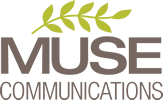Getting Past the ‘Ick’ Factor in Legal Marketing
One of the biggest impediments to embarking on a full-throttle marketing plan is the reluctance many lawyers have to toot their own horn.
I see this more frequently among women lawyers, but it is not exclusively a female problem. Lawyers of all stripes struggle with marketing, particularly when it comes to asserting their expertise and asking for business.
Simply put, lots of people find the act of marketing themselves to be icky. But mortgage and tuition payments don’t grow on trees, so if we want to stay solvent, we have to find ways to make marketing less icky.
Muse Communications was named one of
Texas’ best legal public relations firms by the readers of Texas Lawyer.
Need help turning your legal marketing to-do list into reality? Just drop us a line.
But first, let’s talk about why marketing makes some people so uncomfortable. There are a lot of nuanced and interconnected reasons that mostly boil down to this: it doesn’t align with the way lawyers perceive themselves. Lawyers didn’t go to law school to be salespeople. They went to school to be thinkers, advocates, and counselors.
‘You might find this helpful’
If lawyers want to get comfortable with marketing, they need to do it in a way that aligns with their self-perception — and the way they want others to perceive them. That means adopting a legal marketing program that showcases thought leadership, advocacy, and wise counsel.
This is the essence of what’s known as content marketing. There are a lot of high-tech elements to content marketing that involve search engine optimization (SEO), paid promotion on search engines, etc., but the gist of it comes down to:
Demonstrating expertise
Making sure others see that demonstration of expertise
No matter how you bring attention to your demonstration of expertise, the first step is to provide information that addresses your clients’ and prospective clients’ concerns.
It’s less “Look at me!” and more “Here, you might find this helpful.” The primary goal is to become a source of general value, not “that person who’s always trying to sell me something.”
Here are some tools to do that:
Writing
The written word is the most fundamental form of knowledge sharing. That’s why blogging is so popular and effective. If you have information relevant to your target audience, find a way to put it in writing and disseminate it effectively. That may be an in-house newsletter, an external-facing publication from your company, or you can look for opportunities to write for business and legal publications or bar group newsletters.
One of the reasons blogging is such an attractive option is that you control it, as opposed to an external publication. You can set up a blog and determine your own publication schedule. You have to bring readers to it, of course, but the words are there for all to see.
Speaking
Speaking gigs are one of the best ways to demonstrate your expertise. There are dozens of bar groups and professional associations looking for speakers. And, as you know, if you can offer continuing legal education credits (CLE), even better.
Just as with writing, you’ll need to come up with topics first. If you’re interested in providing CLE, be sure to coordinate with the State Bar to ensure you’re in compliance with all their requirements.
Be sure to recycle your presentation. You can, of course, present it more than once. But you can also turn it into one or more blog posts and share it on your firm’s social media platforms. Bonus points if you turn them into digestible video clips.
Social media
Many lawyers struggle with social media, partly because it’s constantly evolving. Also, nobody wants to say something that could get them in trouble. That concern isn’t completely misplaced, but a dose of common sense should keep most lawyers out of trouble.
One of the best ways to use social media is to amplify the more substantive content you’re creating. Promote your blog posts, speaking engagements, client wins, firm news, and awards, among other achievements. But you can also use it to weigh in on the news of the day by, for instance, opining on a recent Supreme Court opinion.
As with all the other tools outlined here, your social media focus should be on providing genuinely valuable information to your followers and contacts. For more on social media, check out How to Maximize Your Law Firm’s Social Media Presence.
Client alerts/newsletters
If you have a timely update, a client alert that lays out “here’s how it can impact you/your company” is always appreciated by those who receive the information.
More broadly, I recommend that firms put out monthly or quarterly email newsletters. Staying top-of-mind with those who already know and like you is crucial. For more on that, see 16 Impactful Ideas for Engaging Law Firm Newsletter Content.
Some other ways to make marketing yourself less icky
Find an ‘Amplification Buddy’ or two
Take a cue from the women in the Obama White House, who grew tired of being ignored in meetings and having others take credit for their ideas. Several of them got together and agreed to call attention to ideas pitched by the others. The system was dubbed “amplification.”
There are opportunities to amplify all around you. Most people probably do it already by acknowledging their team at the end of a project or calling out the good work of a colleague who helped close a deal or solve a problem.
The only difference is to add some intentionality to it. Find an amplification buddy and highlight each other’s good work. It could be as simple as mentioning to your supervisor that Heidi saved your butt, or “Did everybody see the article Jeff just published?”
With amplification, you’re promoting other people who are, in turn, promoting you. So, it’s not strictly self-promotion, but it has the same effect.
While you’re at it, ask each other for recommendations on LinkedIn. And be sure to recommend others.
Pay attention to the ‘work’ part of ‘networking.’
Some people love cocktail parties and the chance to meet new people. Some people find them uncomfortable and end up hiding in a corner or talking to the one or two people they already know. (I may, in fact, be one of those people.)
But if a networking group is truly worthwhile, don’t join it for the cocktail parties. Serve on a committee or volunteer to work the sign-in desk at the next meeting. Having a job gives you an excuse to get to know others and showcase your expertise.
Multi-task your networking
We’re all busy, and it can be challenging to prioritize marketing, despite knowing we need to do it. But, if you’re like me, you somehow always find a way to say “yes” to the PTA request or the charity you care about.
So, use that tendency to your marketing advantage. Chances are, there are organizations that work on issues you care about and that offer you a good chance to make professional connections. Even if you can’t get on a board or volunteer with the group, there’s a good bet they have a luncheon that you can invite clients or prospective clients to attend.
The charity wins, and you gain some valuable face time with influential contacts.
It doesn’t have to be a charitable organization. Political organizations, hobbies, civic organizations, school groups, and sports teams are all prospective networking groups if you play your cards right.
Follow up/stay in touch
Most networking hits a roadblock with the “stay in touch” part. There often isn’t an organic way to naturally stay in touch with someone you meet at a networking event. For those of us who struggle with networking, there’s no truly comfortable way to do it, but it’s worth pushing through and making it happen anyway.
Start with an email, follow up with a phone call. Share an article of interest. Go to lunch.
Make the focus on building a relationship, sharing knowledge, and being of value. And schedule reminders to do it on a regular basis.
Embrace the ick
Sometimes, we just have to embrace the ick and do something uncomfortable. Staying in our comfort zone is wonderful and safe, but, as we all know, that’s not where growth happens.
Once you’ve established your bona fides with a contact, don’t be afraid to make the ask. Let them know you’re interested in their business and ask how you can get it.
Your clients, prospective clients, and referral sources are always looking for someone who can help them solve their problems — or anticipate problems they don’t yet know about.
They’ll never find you annoying if you’re giving them information they need, and you shouldn’t feel icky about giving it.
Amy Boardman Hunt is all about helping lawyers find their voice and showcase their expertise. When she’s not doing that, she’s trying to find great hiking spots in Dallas. If you know of any – or you need a legal marketing muse – drop her a line at amy.hunt@muselegalpr.com.


